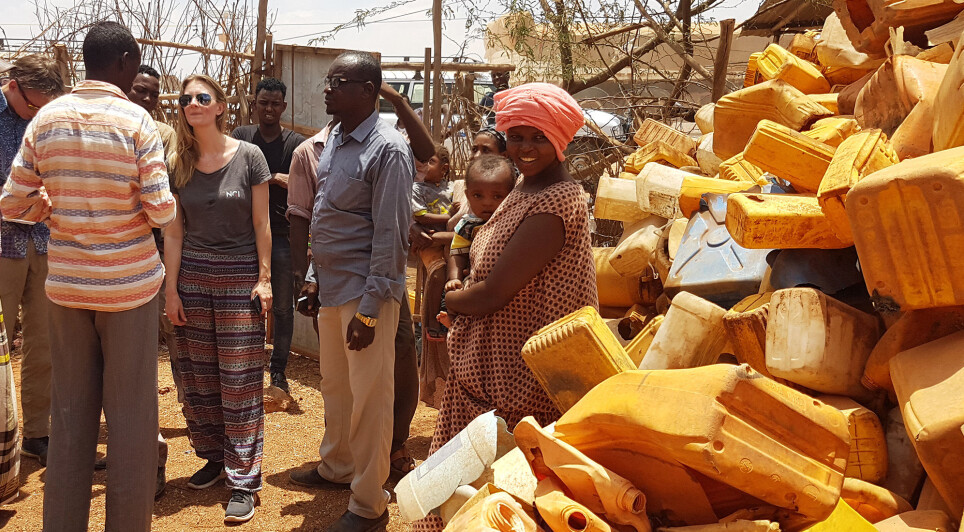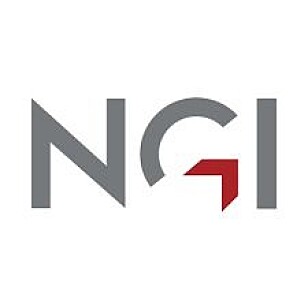THIS ARTICLE/PRESS RELEASE IS PAID FOR AND PRESENTED BY NGI - the Norwegian Geotechnical Institute - read more

Establishing a plastics recycling plant in a refugee camp in Ethiopia
In the Melkadida refugee camp in Ethiopia, several tonnes of plastic waste are accumulated every month. NGI heads a project in which a recycling plant will ensure that the waste is converted into products that can be sold on the local market.
“The recycling plant will reduce plastic pollution in the local area and also create jobs,” says project manager Cathrine Eckbo, who has been central to the project since its inception in 2018.
At that time, Engineers Without Borders (EWB) partnered with the UN High Commissioner for Refugees (UNHCR) to find solutions.
“200,000 refugees generate huge amounts of plastic waste, and in Melkadida there is no waste disposal system. The waste is often burned on the open street, which is harmful both to health and to the environment. We concluded that the best way we could help to meet the challenge was to establish a recycling plant,” says Eckbo.
View film Trash into cash, 2019 status here:
Solutions adapted to local needs and capabilities
In 2019, NGI received funding from the Norwegian Retailers’ Environment Fund to further develop the project in collaboration with EWB, the UNHCR and the Norwegian Refugee Council.
“Together with the local population, we found that we needed to establish a system for collecting, sorting and washing the plastic waste. And we wanted to create a clean-burning pyrolysis furnace that could use waste as an energy source and melt down high-quality plastic that can be recycled,” says Eckbo.
Both pyrolysis furnaces and plastic washing facilities can be bought off the shelf. But would they work in one of the world's poorest and most remote areas?
“Instead of purchasing a ready-made facility, we are working on solutions that both the refugees and the local population can set up and operate themselves,” says Eckbo.
So, when the plastic is to be cut up, an old pedal bike and muscle power are used, rather than unstable and hard-to-obtain electricity.
“Melkadida is located in a desert area, on the border with Somalia. Water is a very scarce resource, for example. The solution we are creating to clean the plastic must therefore use as little water as possible, and the water must be reusable,” explains Eckbo.
Construction and testing of pyrolysis furnace
The biggest challenge in the project so far has been to use simple tools to build an effective pyrolysis furnace from materials available in the camp.
“We were doing fieldwork in Ethiopia in January 2020, but then along came Covid-19. So we moved the project to Oslo,” says Eckbo.
Together with Human Brights and EWB, the time has been spent building a prototype pyrolysis furnace on NGI's premises in Oslo and establishing procedures for its use.
“Although the pandemic has meant that we have not been able to travel to Ethiopia as planned, we have used the time well and further developed and tested a recycling plant that we believe will work locally,” says Eckbo.
However, testing the furnace in Oslo in the winter time provides completely different conditions than in Melkadida with scorching sun and high temperatures.
“So we look forward to being able to do further testing in Melkadida as soon as we can.”
View film Trash into cash here:
———
Read the Norwegian version of this article at forskning.no
See more content from the Norwegian Geotechnical Institute:
-
PFAS: This could stop the dangerous chemicals from leaking into the environment
-
This determines how dangerous a dam failure can be
-
Will it be possible for humans to build and live on the Moon for extended periods of time?
-
NGI-led EU project will digitise the mining industry and ensure increased sustainability
-
Linking art and research to disseminate knowledge on plastic pollution
-
Your teflon frying pan and shampoo release invisible pollution. Huge EU project aims to stop this





































